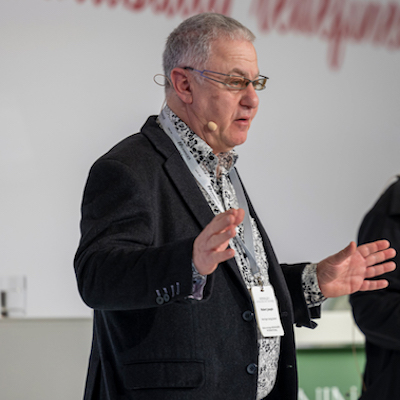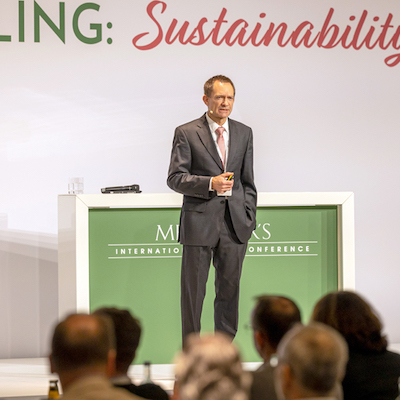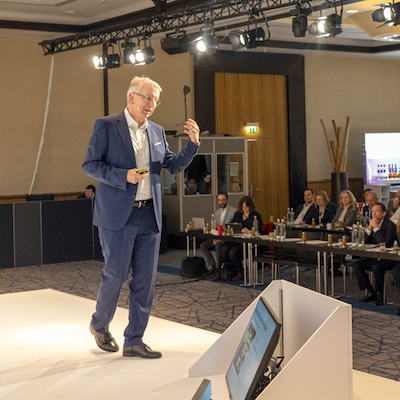Sustainability is a hot topic. At the International Wine Conference held by Meininger on the day before ProWein, some 120 participants from 18 countries looked at a variety of approaches to sustainable action along the entire value chain under the motto: "From Production to Selling: Sustainability Redefined".
Insights from research and practice
First-class speakers provided interesting and highly relevant insights:
Robert Joseph's opening presentation was about the difference between society's wishes and reality: What do we need to do to get consumers to actually buy lighter bottles? How can we truly combine environmental and social sustainability? But he also called for more realism. The wine industry's carbon footprint is only 0.15% of the nearly 40 gigatons produced globally in 2021. But it could encourage other industries to do the same.
Recent scientific findings were presented by Julia Frings of IFH Cologne on consumer attitudes towards sustainability and by Dr. Helena Ponstein (KlimaneutralerWein.de) on the carbon footprint of the wine industry.
Prof. Marc Dressler, Ludwigshafen University of Applied Sciences/Weincampus Neustadt, showed why sustainable business is a must for the industry.
Prof. Simone Loose, University of Applied Sciences Geisenheim, Germany, introduced the topic of packaging: Recent study results show how packaging options beyond the glass bottle are coming onto the market in various countries. These new types of packaging were presented by their producers: The FrugalPac bottle made of paper, the flat plastic bottle from Packamama and the new reusable glass concept for the 0.75-litre-bottle from Baden-Württemberg.

Saskia de Rothschild, CEO of the Domaines Barons de Rothschild (Lafite) reported on how large, internationally active, producers are making their corporate strategy more sustainable. Starting from the vineyard, where biodynamic approaches and a lot of practical research are in the foreground, socio-economic aspects are also included in the concept, depending on the location.

Sustainability in marketing and sales
Prof. Michael Bernecker, CEO of the German Institute for Marketing, explained how companies can credibly market their sustainable products without falling into the trap of greenwashing. For him, the importance of labels cannot be overestimated: "Consumers use expert assessments as an important criterion in their decision-making.

It was also emphasized that it is not only producers who need to lead the way with sustainable approaches. Two approaches to sustainability in the wine trade were presented:
- Sara Norell is Director of Assortment, Purchasing and Supply Chain at the Swedish alcohol monopoly Systembolaget and reported on how her company intends to halve its carbon emissions within eight years.
- Dr Keith Ulrich is the chairman of the board of Fair and Green e.V. The association certifies not only wineries but also wine shops that demonstrate their sustainability efforts in everything from product range design to water, electricity, staff management and accounting.


Comparison of international approaches
The closing panel featured three representatives from three countries with different approaches to sustainability.
- Belinda Jackson, Sales and Marketing Manager of New Zealand's Lawson Dry Hills Winery, gave an insight into how her country has achieved an almost entirely sustainably certified wine industry.
- Siobhan Thompson is the CEO of Wines of South Africa. There, the codex "Wine & Agricultural Ethical Trade Association", WIETA for short, also focuses on social sustainability.
- Finally, economist Marc Dressler explained how economic sustainability fits into the triad of ecology, society and economy.
And the audience?
The participants were consistently enthusiastic. "It was terrific," said Andrea Wirsching from the Franken winery Hans Wirsching, "The conference has given us so much input and therefore so many arguments for a more sustainable approach in the industry."


"The presentations and content were highly relevant! Sustainability is the most pressing issue facing the wine industry today. We in California have been working in this area for years, so it was very enriching for us to be here discussing national and international solutions with attendees from around the world," said Honore Comfort, Vice President International Marketing California Wine Institute.
"There are no easy answers when it comes to sustainability issues. We hope to have shown at the conference how important it is that the three pillars of sustainability interlock," said Dr. Anja Zimmer, Editor-in-Chief of MEININGER'S INTERNATIONAL. "And that we must not lose sight of the consumer, because we can only ensure sustainability in the long term if the consumer goes along with us. To this end, we presented solutions and best practices.
"We are proud that we were able to assemble such a high-caliber and international line-up of speakers," said Alexandra Wrann, editor-in-chief of WEINWIRTSCHAFT. "The mix of research results, practical experience and entrepreneurial innovations was very well received by the participants. We want to build on this and make the event even more international and diverse in the future."
For the first time this year, Meininger's International Wine Conference was organized by the new editors-in-chief of the two B2B trade magazines WEINWIRTSCHAFT and MEININGER'S INTERNATIONAL. The next conference will take place on March 9, 2024, as usual the day before ProWein. The topic will be announced shortly. AW/AZ
All photos: Sascha Kreklau








